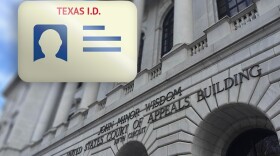Attorneys are headed back to court because of the state’s voter ID law. This time it’s over how Texas election officials are explaining the changes they were forced to make to the law.
On Tuesday, the U.S. Justice Department filed a motion with the plaintiffs in the case. They say the state is misleading voters about the new rules.
And It was just a few weeks ago that this was all pretty much settled.
A federal appeals court had ruled the state’s strict photo ID law was discriminatory, a federal judge signed off on an agreement that would loosen those rules and there was a plan in place for letting people know about those changes.
However, plaintiffs say the state isn't executing effectively on that last part.
“What our fear is that the state is trying to set up a catch-22 with people who have a real difficulty getting an ID,” says Chad Dunn, a lawyer representing some of the plaintiffs in this case.
Dunn says the concern here is about language. It’s about how the state describes people’s options when they head to the polls.
"I’m afraid we are entering a new era of voting rights struggle."
According to the motion, the state’s voter education and poll worker training documents mislead people about who can sign a declaration and vote a regular ballot. Dunn says these materials say voters who “have not obtained” and “cannot obtain” a photo ID can sign the document.
“But that’s not what the courts say are the people that should be protected by this procedure,” he explains. “The people who should protected are people who have a reasonable impediment. And, so, we are trying to make sure that the court record and the election administrators are clear on that point.”
And even though the quibble here is about just a couple of words, attorneys say those words could make a big difference.
Ezra Rosenberg—who also represented plaintiffs in this case – says the language here could influence whether people will vote or not. He says they could be afraid to sign something that they think will be unintentionally inaccurate.
“That’s why we want to clear this up,” Rosenberg says. “I mean, the fact of the matter is, they have to be told what is accurate in line with what the court has specifically ordered.”
And, attorneys say, this whole thing should have ended once the judge signed off on the changes to the law. According to Dunn, though, this is how voting rights battles are fought now.
“I’m afraid we are entering a new era of voting rights struggle,” he says. “You know, a lot of these sort of things happened, unfortunately, also in the South back in the '40s, '50s and '60s, where the state would pass a law that prevented citizens from voting and the courts, the federal government and the state would find a new path.”
The Texas Secretary of State’s office says it is not commenting on the motion right now. A federal judge has set a hearing for this coming Monday.
You can read the entire motion below:
_







